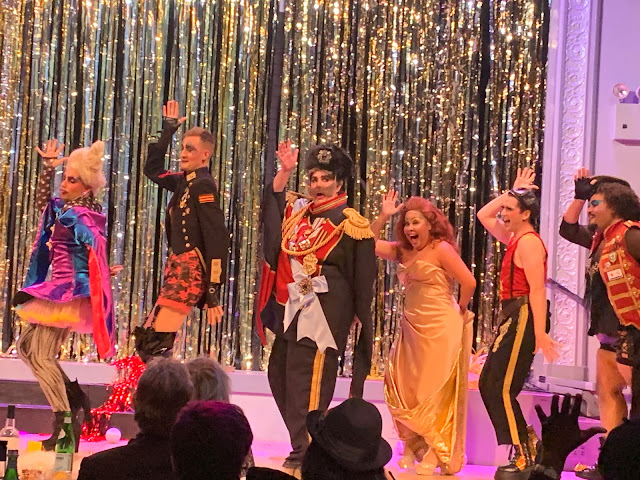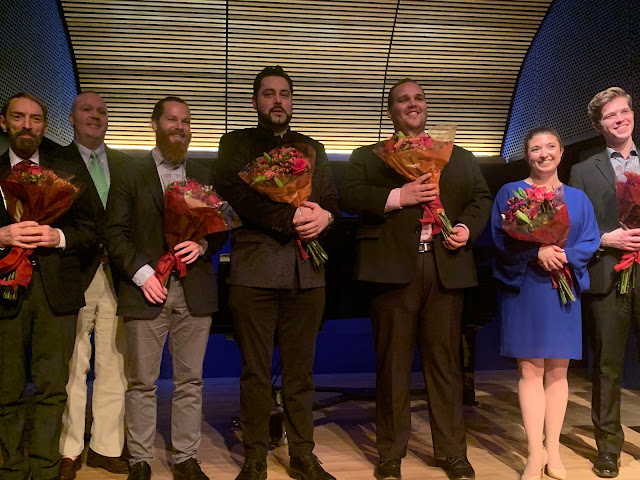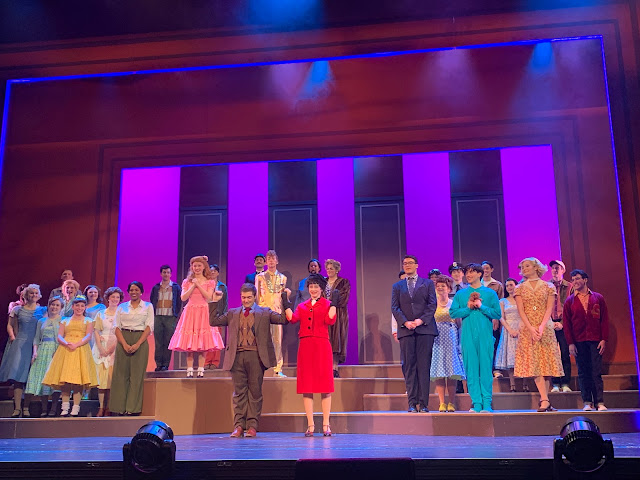MISSION
Sunday, November 19, 2023
A STYLISH PINAFORE
Friday, November 17, 2023
BRITTEN AND THE BARD
Friday, November 10, 2023
THE GOLDEN COCK(erel)

Thursday, November 9, 2023
OPERA INDEX 2022 AWARDS RECITAL
Wednesday, November 8, 2023
ACTION FOR ARTISTS
Sunday, November 5, 2023
RIBBIT!
Douglas Sills and Kevin Chamberlin in Stephen Sondheim's The Frogs by Master Voices
(photo by Erin Baiano)
In 405 B.C. the playwright Aristophanes won first prize for his play Frogs in which his hero Dionysos and the slave Xanthius travel to the Underworld to bring back Euripides to fix the problems of Athens, suffering under a lengthy war with Sparta. A debate (agon) between Euripides and Aeschylus persuades Dionysos to bring back the latter instead of the former. The topic is a serious one but handled with a lot of humor, much of it sexual. The frogs would seem to represent the "sheeple" who resist using art to effect political change.
In 1941, Burt Shevelove, a graduate student at Yale University, adapted the play, directed it, and staged it in the university gymnasium. It took three decades for the work to be revised with music by Stephen Sondheim and again be produced by The Yale Repertory Company. Nathan Lane uncovered the script shortly thereafter and began revising and sketching fresh ideas. Sondheim wrote some new songs. The work has had a checkered production history and mixed critical responses. It was last seen at the Vivian Beaumont Theater in 2004.
We personally would go to Hades to bring back Mr. Sondheim whose grasp of character and artistry at setting the English language have not been matched. We are grateful to Ted Sperling, Conductor and Director of Master Voices for presenting a concert version at the Rose Theater. Although there were no sets, Tracy Christensen's costumes went a long way toward creating each character. Nathan Lane took on the role of narrator, bridging gaps between scenes; the actors were universally superb in spite of using scripts in hand. Thank goodness they were not standing at podiums!
As in the original, the bitter pill of political despair is sugar-coated with humor, much of it bawdy. The musical numbers were always engaging and the choreography by Lainie Sakakura was brilliant. Dancers clad in green body suits tumbled and leapt around the stage. All the parts were astutely cast. Of course the massive chorus of voices was superb.
We knew we were in for a treat right from the start with an hilarious scene advising audience members how to behave. True to the original, Dionysos (Douglas Sills) and his slave Xanthias (Kevin Chamberlin) plan to go to Hades to bring back a playwright whose work could possibly help "Athens" in troubled times. They establish some rather negative opinions of frogs and then consult with Heracles (Marc Kudisch) in a very funny song "Dress Big" in which the god known for his prowess instructs the somewhat effeminate Dionysos how to walk with a swagger and talk tough.
Then there is a very funny scene with Choron (Chuck Cooper) who will take them across the river Styx for a price. There is some THC-fueled humor about cruise lines and their responsibilities, or lack thereof.
Upon arrival, the pair of travelers get to meet the extremely swishy god of the Underworld --Pluto (Peter Bartlett). There is a great deal of humor about how wonderful life is in Hades where no one has to worry about dying because they are already dead.
Once the pair meet up with George Bernard Shaw (Dylan Baker), the tone gets a bit more serious. Says Dionysos " I want to take him back to earth with me. You see, the world is in such a mess. Everyone lives in fear now. Our leaders have filled us with fear. And that's the way they like us. Frightened and vulnerable. So, they can do as they please. And I just think if Shaw were to write again, he could show us the truth about ourselves and how we live."
It certainly does appear that Shaw has all the answers embedded in his scathing wit. "Basically, we have two kinds of leaders--ineffectual and corrupt". What will shake up the complacent "frogs" of the world? Says Dionysos about his trip, "Look, I'm no hero. I made my way here through a river of frogs. It wasn't easy. They tried to stop me. The frogs like things the way they are. 'Earth is well enough', they say. 'Let well enough alone.' And I'm afraid more and more people are starting to think the same way."
And then comes the twist. Shakespeare (Jordan Donica) appears on the scene and the agon begins. Shaw denigrates Shakespeare but Dionysos decides to take The Bard up to earth instead of Shaw. "In order to change things, we need to touch people's hearts as well as their minds. Remind people what's right with them as well as what's wrong with them. If we really want to be heard, the words should be poetic. Bernard... I have decided that you shall stay here in Hades."
What a perfect summation of the role of art in our lives! We personally have been touched by Shaw and Shakespeare, but, above all, by Sondheim.
© meche kroop





